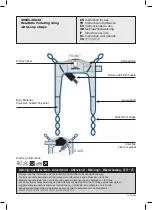
Diagonal Cradle
for Sitting Baby:
This position is great for
babies who can hold up
their head and who want
to look around (rather than
feed or sleep). Note that
the diagonal cradle position
can be used with a large
toddler who has fallen asleep
because their legs will poke
out at your hip but their head
is supported by the side rail
which you can loosen off.
Hold baby against your
shoulder and get ready to move
the sling not the baby.
Pull the side rail
✽
up to baby's
neck and line the stitching to
their spine.
Bend over and lay baby in the
sling on that diagonal line.
Pull the inner rail up between
you and down towards their
feet at your hip.
Baby sits sideways against
you and gets a good view
of the world.
3.
5.
2.
4.
1.
Kangaroo Position:
Just like a little joey, some
babies really like to look
out from a vantage point
on your belly. Works well
for babies who can't sit
unaided yet as their back is
supported by your tummy,
but baby needs to be the
flexible kind who can cross
their legs in front. This
position requires wearing
the sling a little lower, you
may need to make the
front fabric tab a bit longer.
Hold baby's legs in the
cross-legged position.
Seat them in the middle
of the sling.
Ensure the back rail is pulled up
between you and baby.
Keep a hand on them at all
times to prevent front toppling.
3.
4.
2.
1.
Hold baby against your
shoulder and put their feet
through the sling.
Reach behind and tighten both
rails so baby is held firm.
Pull the top rail right up to
baby's shoulders.
????
Ensure baby's head is
supported while they are too
little to sit on their own.
Upright Position:
Some babies don't like to
lie down in the sling and this
position works well prior to
them being able to sit on
your hip. You will need to
make the sling very tight and
check that the bottom rail is
securely behind their knees.
4.
3.
2.
1.
Try these
positions when
baby wants to
see out but can't
quite straddle
your hip yet –
at around
3 to 6 months.









